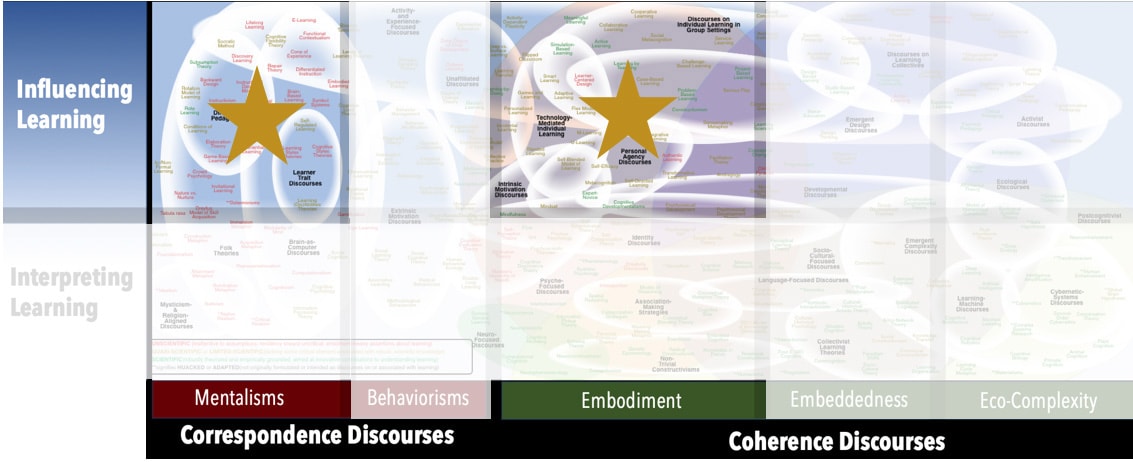AKA
Efficacy Expectations
Perceived Self-Efficacy
Focus
Relationship between engagement and one’s self-beliefPrincipal Metaphors
Self-Efficacy is not aligned with a particular theory of learning, which means that almost any theory of learning can be aligned with it. That said, the metaphors and images most often invoked fit most closely with the Attainment Metaphor …- Knowledge is … a territory/area/domain/field (typically involving challenge)
- Knowing is … attaining a goal
- Learner is … a seeker (individual)
- Learning is … journeying (arriving at, reaching, progressing, accomplishing, achieving)
- Teaching is … leading, guiding, directing, facilitating
Originated
1990sSynopsis
“Efficacy” has to do with efficiency, utility, value, and ability. Self-Efficacy is about one’s awareness of and confidence in one’s own efficacy – which, in turn, has implications for one’s belief in one’s capacities to meet challenges and reach goals. High Self-Efficacy is linked to effort, strategizing, persistence, and resilience on tasks, as well as more flexible and global views of challenges and greater ownership of both successes and failures. Low Self-Efficacy manifests as over-estimating task difficulty, sometimes-unpredictable behavior while engaged in tasks, and tendencies to link both successes and failures to luck or others. Research in Self-Efficacy is focused on models and scales that are used to distinguish contributing factors (e.g., experiential, psychological, physiological, relational, and environmental), define paths of development, identify dynamics, and assess educational interventions. Precursors to Self-Efficacy (listed chronologically)include:
- Voluntarism (Wilhelm Wundt, late 1800s) – an attempt to systematically study human mind and human will by observing cultural behaviors, aimed at identifying the basic elements of consciousness
- Reciprocal Determinism (Reciprocal Causation; Triadic Reciprocality; Triadic Reciprocal Determinism) (Albert Bandura, 1980s) – the principle that there is a reciprocal, co-determining relationship between one’s thoughts and actions and one’s context
- Self-Attention Theory (Charles Carver, 1980s) – a perspective one’s capacity to regulate one’s own behavior. Three necessary processes for effective self-regulation are posited: self-focused attention, a clear behavioral standard, and adequate success (to inspire continued effort)
- Instructional Self-Efficacy – the teacher’s personal confidence in their ability to support student learning
- Collective Teacher Efficacy (Collective Efficacy) – on a school or jurisdiction level, teachers’ confidence that their collective efforts will positively influence student learning
- Cognitive Empowerment (Cognitive Model of Empowerment; Psychological Empowerment) (Ken Thomas, Betty Velthouse, Gretchen Spreitzer, 1990s) – a set of four factors that are purported to serve as both foci of assessment and sites of empowerment of workers: Sense of Impact, Competence, Meaningfulness, Choice
- Ego Depletion (Roy Baumeister, 2000s) – rooted in an analogy to a muscle that can be strengthened or fatigued, the debated suggestion that one’s “ego” (in this instance, referring to self-control, willpower, and other traits associated with Self-Efficacy) can be depleted, leading to impaired decision-making
Commentary
On some levels, Self-Efficacy amounts to common sense – a formalization of the old saw, “Whether you think you can, or you think you can’t – you’re right” (attributed to Henry Ford). Some critics thus argue that its surrounding research is circular and uninformative, in that it is no surprise that strong self-efficacy contributes to greater success, which contributes to stronger self-efficacy … and so on. Additionally, there is a pronounced (but not universal) tendency of proponents to use the word innate when referring to personal abilities and traits, summoning long-debunked Nativism assumptions.Authors and/or Prominent Influences
Albert BanduraStatus as a Theory of Learning
Self-Efficacy is not a theory of learning.Status as a Theory of Teaching
Self-Efficacy is a theory on factors that influence learning. A major focus of Self-Efficacy research has been to offer teachers strategies to promote relevant attitudes, awarenesses, and beliefs in their students – and so, on those counts, Self-Efficacy could be described as a theory of teaching.Status as a Scientific Theory
There is ample and robust evidence to support the sub-constructs of Self-Efficacy. However, as relevant to the criticisms noted above, it is not clear that the construct itself is well-conceived or rigorously understood.Subdiscourses:
- Cognitive Empowerment (Cognitive Model of Empowerment; Psychological Empowerment)
- Collective Teacher Efficacy (Collective Efficacy)
- Ego Depletion
- Instructional Self-Efficacy
- Reciprocal Determinism (Reciprocal Causation; Triadic Reciprocality; Triadic Reciprocity; Triadic Reciprocal Determinism)
- Self-Attention Theory
- Voluntarism
Map Location

Please cite this article as:
Davis, B., & Francis, K. (2023). “Self-Efficacy” in Discourses on Learning in Education. https://learningdiscourses.com.
⇦ Back to Map
⇦ Back to List
